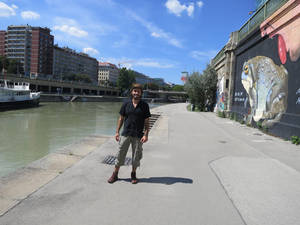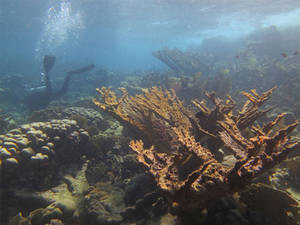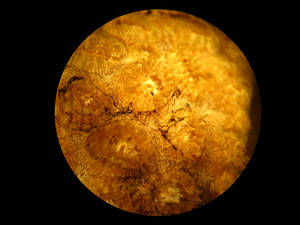Sommerserie: Wien erforschen (1)
| 07. August 2012
In der uni:view-Sommerserie erzählen internationale Lise-Meitner-Fellows von sich und ihrer Forschung an der Universität Wien, Zukunftsplänen und ihren Lieblingsplätzen in Wien. Heute: Pedro Frade aus Portugal, der am Department für Meeresbiologie zu Korallenriffen forscht. (In Englisch)
Why Vienna and the University of Vienna:
Although the actual decision of moving to Vienna was based on my private life, there was a set of motivations that lead me to choose for the University of Vienna. First of all, the fact I knew my advisor, Gerhard Herndl, from the times in which we both worked in the Netherlands, was a decisive reason for me to choose the Department of Marine Biology. Having the chance of writing a proposal combining the expertise of the Department on microbial community structure and biogeochemistry of marine environments with my previous knowledge on coral physiology and coral reef ecology was an unique opportunity to further develop my research career. Contrastingly, in science, the larger the scale is of the patterns one wants to explain, the smaller is actually the scale of things one needs to look at and investigate. In this respect, it has been an interesting process for me to find out that a lot of answers that elucidate about the functioning of coral reefs as large-scale ecosystems are actually locked in micro-scale processes, particularly on the microorganism level. This is also the approach the Department of Marine Biology has taken to understand the functioning of main oceanic water masses, and that has been quite inspiring for me. Furthermore, Vienna has traditionally been a place for researchers working on symbiosis, and at the moment there are several research groups at the University that deal with this topic. This makes the University of Vienna an excellent place to work on the interaction between microbes and animals, such as corals, and I believe the project I idealized found a good "home" here in Vienna.
My Lise Meitner Project:
Coral reefs are globally threatened by a number of reasons that directly or indirectly relate to human activities. Surprisingly, many of these degradation processes are actually mediated my microbes, which can contribute to either worsen or ameliorate such processes. An example is, for instance, the occurrence of coral diseases. These are reported to contribute to mass coral death, and are often the result of an infection by a pathogenic microorganism that becomes active when the coral reef environment changes, such as in the case of pollution discharges, or when seawater temperature rises. These processes have extensive consequences on coral reef health and on the ecological and economical functions performed by these ecosystems on which many millions of humans depend. It is therefore important to understand the particular role of microbes in keeping the natural health status of coral reefs around the world.
Specifically interesting is the balance created on the boundary layer between the coral surface (epithelium) and the surrounding seawater. Just like the mucus produced in the guts of humans, the mucus produced by the coral on its surface sustains a diverse microbial assemblage and acts as a first barrier of defence against a wide range of environmental disturbances, thereby contributing to the health of the coral and the survival of coral reefs.
Surprisingly, only little is known about the physical and chemical properties of this mucus layer, how it is produced and maintained by the coral. Particularly, the relation between the composition of the mucus and the microbes that inhabit it remains largely enigmatic. The main goal of this project is to study the dynamics and function of coral mucus and its associated microbes in order to understand and predict impacts on coral reefs arising from environmental stressors such as a rapidly changing climate.
My favourite places in Vienna:
I had already time to get to know Vienna, and I also know a bit of the city from several previous visits. I must say that my favourite places are definitely not those where one finds the obsolete, yet imposing remnants of the empire. I am much more fond of the progressive, alternative and multicultural Vienna. In general, my favourite places are the Donauinsel and the Donaukanal, the nightlife area around the Gürtel, Grinzing and the beautiful view from the Cobenzl or the Kahlenberg, and also several cultural centres such as the WUK or Das Werk. A particularly "gemütlich" place for me to spend the evenings is the Mexican restaurant Los Mexikas!
Something surprising:
The relation of the people of Vienna with their river was quite surprising at first. I come from Lisboa, a city with a river but where everyone always wants to reach the sea. In Vienna the Donau serves the purpose of giving the Viennese the feeling of escaping to somewhere else. On its margins you can sunbath (even with your feet on the sand!), you can walk around as if being in Copacabana, in the waters you can swim or practice water sports. Indeed the river brings a lot of life to Vienna.
Another thing that surprised me quite a lot, as I was not aware of it, is that in Vienna there is very good wine, and vineyards grow just here over the hills surrounding the city! I was surprised by how pleasant it can be to go sit in a Heurigen and experience the taste of local food and drinks.
Plans for the future:
Vienna is now my home and although I feel embraced here by the city and by the people, I know that there will be a time in which I will need to find my way back to the seashore. I would ideally like to go back to Portugal and find a research and teaching position at the University there. However I realize that these days the funds available are always used to cover up the mistakes of banks and big enterprises, to "calm down the markets" (as I often hear) instead of investing in health, education and science, as means to establish a developed, fair and economically-even society. Anyway, this Lise Meitner research programme will run for another year and a half and during that time I will be looking for future collaborations and project opportunities, both here in Vienna and elsewhere around. I would actually like to stay a bit longer here in Vienna!
| Short CV: Pedro Frade was born on 15 June 1979 in Lisbon, Portugal. From 1997-2002 he studied Marine Biology at the University of Lisbon. He graduated in 2002, after performing his final internship on the island of Curaçao, where he first came in contact with coral reefs and their accelerated state of degradation. After a year working at the University of the Azores on a project to establish new Marine Protected Areas, in 2004 he was granted a 4-year scholarship from the Portuguese Science Foundation to do his PhD in the Netherlands. The PhD project, completed in 2009 with the thesis entitled "Corals through the light: phylogenetics, functional diversity and adaptive strategies of coral-symbiont associations over a large depth range", took place at the University of Amsterdam, the Netherlands Institute for Sea Research and the CARMABI Foundation (Curaçao), and was supervised by Rolf Bak. In 2010 Pedro Frade worked as a Postdoctoral researcher at the National Autonomous University of Mexico, in Puerto Morelos, Mexico, on a project about coral calcification and the effects of ocean acidification on coral reefs. Since January 2012 he is a Lise-Meitner postdoctoral fellow at the Department of Marine Biology, at the University of Vienna, working on microbes associated with coral mucus. |
|---|
Mit dem Lise-Meitner-Programm fördert der FWF hoch qualifizierte WissenschafterInnen aller Fachdisziplinen, die an einer österreichischen Forschungsstätte zur weiteren Entwicklung der Wissenschaften beitragen können. (Copyright Vorlage Coverbild: studio.es/flickr.com)



